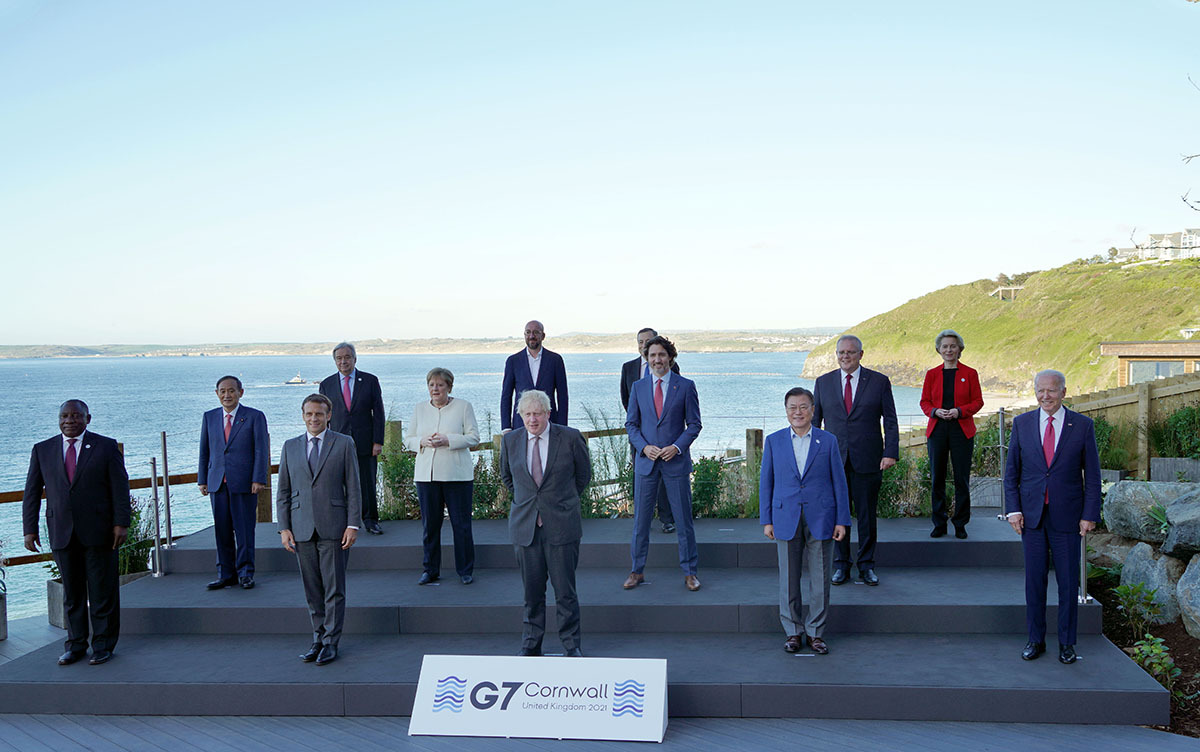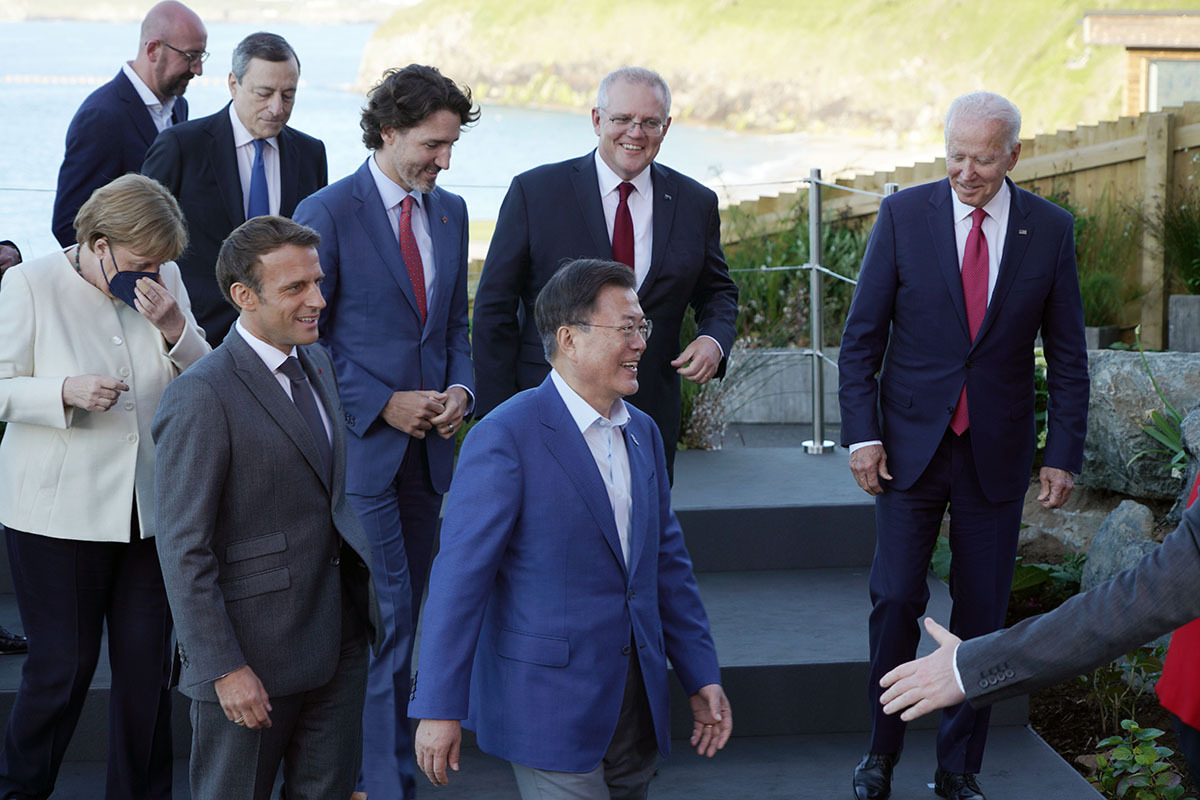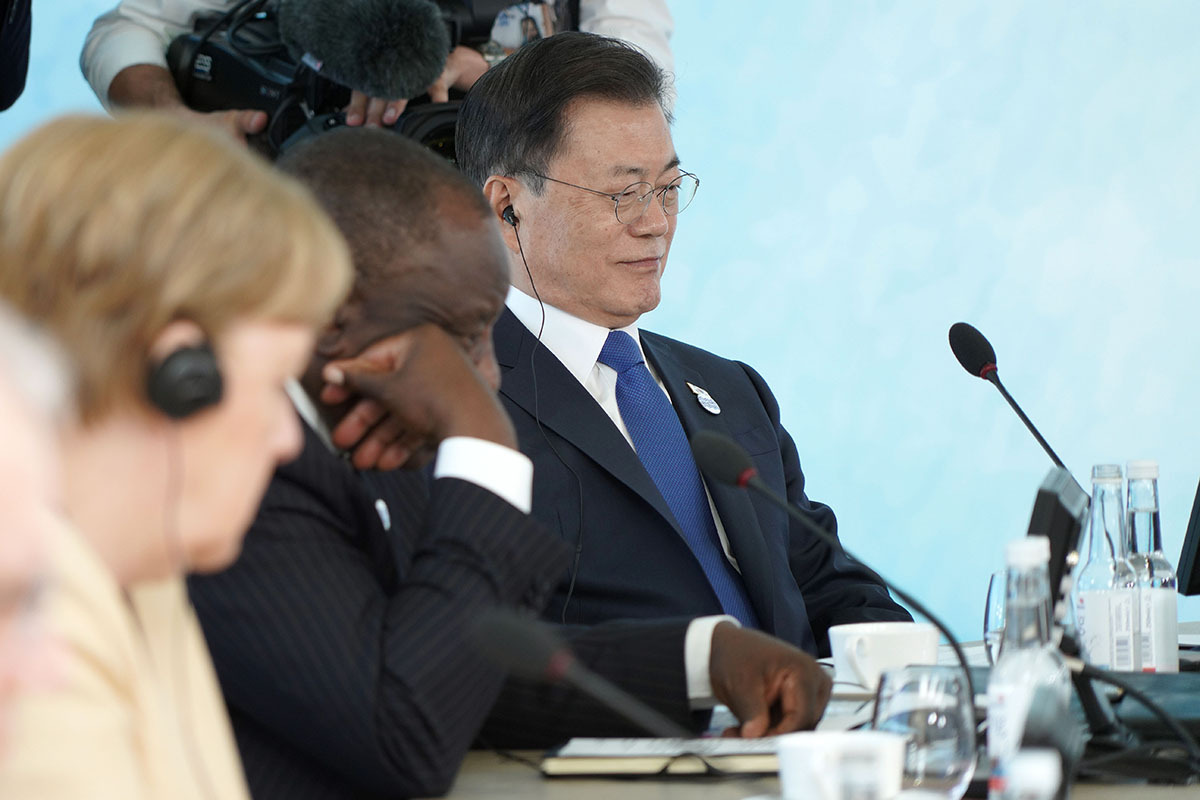Moon’s Europe trip ushers Korean diplomacy into new era
By Ahn Sung-miPublished : July 4, 2021 - 17:56

President Moon Jae-in’s visit to Europe last month ushered in a pivotal moment for South Korea: His debut at the Group of Seven meeting signaled the country’s elevated status, on a par with the world’s wealthiest democracies.
It also heralded the return of in-person diplomacy since the coronavirus pandemic forced the leaders to communicate virtually for more than a year. It was Moon’s second overseas trip since the pandemic, following his brief visit to Washington for a summit with President Joe Biden in May.
Moon touched down in Cornwall, on the southwestern tip of England, June 11 to attend the G-7 summit, the first in-person meeting in two years for the seven advanced nations: Canada, France, Germany, Italy, the UK and the US. South Korea was invited as a guest this year along with Australia, South Africa and India. After the summit, Moon visited Austria and Spain for state visits.
Against the backdrop of a scenic ocean, Moon joined hands with other world leaders to address equitable access to vaccines, the COVID-19 recovery, climate change and global taxes.
Specifically, Moon shared his vision of establishing a global vaccine hub in South Korea as a way to scale up production and tackle vaccine shortages, while calling on the G-7 nations to expand vaccine partnerships. Moon also pledged $200 million in aid this year and next year through the COVAX program, which is providing vaccines for lower-income countries.
On the sidelines of the summit’s main sessions, Moon held a brisk round of bilateral sessions with his Australian, German, British, French and EU counterparts. Agenda items included vaccine cooperation, the green economy, tech cooperation and peace efforts on the Korean Peninsula.
Reflecting on his time at the G-7, Moon said it was a “proud achievement” for the South Korean people, saying the republic had become a nation that other countries hoped to work with and had also succeeded in raising its voice for a sustainable world.
It also heralded the return of in-person diplomacy since the coronavirus pandemic forced the leaders to communicate virtually for more than a year. It was Moon’s second overseas trip since the pandemic, following his brief visit to Washington for a summit with President Joe Biden in May.
Moon touched down in Cornwall, on the southwestern tip of England, June 11 to attend the G-7 summit, the first in-person meeting in two years for the seven advanced nations: Canada, France, Germany, Italy, the UK and the US. South Korea was invited as a guest this year along with Australia, South Africa and India. After the summit, Moon visited Austria and Spain for state visits.
Against the backdrop of a scenic ocean, Moon joined hands with other world leaders to address equitable access to vaccines, the COVID-19 recovery, climate change and global taxes.
Specifically, Moon shared his vision of establishing a global vaccine hub in South Korea as a way to scale up production and tackle vaccine shortages, while calling on the G-7 nations to expand vaccine partnerships. Moon also pledged $200 million in aid this year and next year through the COVAX program, which is providing vaccines for lower-income countries.
On the sidelines of the summit’s main sessions, Moon held a brisk round of bilateral sessions with his Australian, German, British, French and EU counterparts. Agenda items included vaccine cooperation, the green economy, tech cooperation and peace efforts on the Korean Peninsula.
Reflecting on his time at the G-7, Moon said it was a “proud achievement” for the South Korean people, saying the republic had become a nation that other countries hoped to work with and had also succeeded in raising its voice for a sustainable world.

“We pledged to play a part in making the world more sustainable, commensurate with our national stature and power. We also stressed our role as a bridge between advanced and developing countries,” said Moon in a social media post.
Moon was keen on stepping up “vaccine diplomacy” during his stay in Europe. He met AstraZeneca CEO Pascal Soriot in the UK and requested that the two sides maintain continued cooperation in the biohealth sector, especially toward the stable production and supplying of coronavirus vaccines.
Moon also held a videoconference with German pharmaceutical company CureVac’s CEO Franz-Werner Hass, with Moon asking the chief to consider South Korea as a possible Asia-Pacific production hub for the company’s upcoming COVID-19 vaccines.
After three days of G-7 summitry, Moon and his delegation flew to Austria for a state visit, marking the first visit to the country by a South Korean president since the two sides established diplomatic ties in 1892.
Moon met with his Austrian counterpart, Alexander Van der Bellen, for a summit that served as an occasion to bolster bilateral relations ahead of the 130th anniversary next year.
He also held talks with Chancellor Sebastian Kurz and agreed to elevate the two countries’ relations to a “strategic partnership.” The two countries vowed to advance cooperation in various fields such as politics, the economy, science and technology, and culture and the arts.
During a joint press conference with Van der Bellen, Moon also said he will actively push for COVID-19 vaccines to be supplied to Pyongyang if the regime accepts his offer.
Moon was keen on stepping up “vaccine diplomacy” during his stay in Europe. He met AstraZeneca CEO Pascal Soriot in the UK and requested that the two sides maintain continued cooperation in the biohealth sector, especially toward the stable production and supplying of coronavirus vaccines.
Moon also held a videoconference with German pharmaceutical company CureVac’s CEO Franz-Werner Hass, with Moon asking the chief to consider South Korea as a possible Asia-Pacific production hub for the company’s upcoming COVID-19 vaccines.
After three days of G-7 summitry, Moon and his delegation flew to Austria for a state visit, marking the first visit to the country by a South Korean president since the two sides established diplomatic ties in 1892.
Moon met with his Austrian counterpart, Alexander Van der Bellen, for a summit that served as an occasion to bolster bilateral relations ahead of the 130th anniversary next year.
He also held talks with Chancellor Sebastian Kurz and agreed to elevate the two countries’ relations to a “strategic partnership.” The two countries vowed to advance cooperation in various fields such as politics, the economy, science and technology, and culture and the arts.
During a joint press conference with Van der Bellen, Moon also said he will actively push for COVID-19 vaccines to be supplied to Pyongyang if the regime accepts his offer.

Moon’s final stop was Spain, marking the first visit by any foreign leader to the country since the onset of the pandemic. It was also the first time in 14 years that a South Korean leader had visited Spain.
He met with King Felipe VII at the royal palace in Madrid and held talks with Prime Minister Pedro Sanchez.
The two countries agreed to upgrade their bilateral ties to a “strategic partnership,” deepening cooperation in diverse fields -- especially renewable energy, digital economy and construction -- and seeking new business opportunities together.
The two also agreed to reaffirm their commitment to the complete denuclearization of the Korean Peninsula and the establishment of permanent peace here.
Wrapping up an eventful week in Europe, Moon said his trip had been physically challenging but rewarding and full of achievements. “I witnessed South Korea’s elevated status at the G-7, and learned about Austria’s pride in arts and culture, as well as Spain’s will and passion for a new era,” said Moon on his social media channel.
He met with King Felipe VII at the royal palace in Madrid and held talks with Prime Minister Pedro Sanchez.
The two countries agreed to upgrade their bilateral ties to a “strategic partnership,” deepening cooperation in diverse fields -- especially renewable energy, digital economy and construction -- and seeking new business opportunities together.
The two also agreed to reaffirm their commitment to the complete denuclearization of the Korean Peninsula and the establishment of permanent peace here.
Wrapping up an eventful week in Europe, Moon said his trip had been physically challenging but rewarding and full of achievements. “I witnessed South Korea’s elevated status at the G-7, and learned about Austria’s pride in arts and culture, as well as Spain’s will and passion for a new era,” said Moon on his social media channel.








![[Graphic News] More Koreans say they plan long-distance trips this year](http://res.heraldm.com/phpwas/restmb_idxmake.php?idx=644&simg=/content/image/2024/04/17/20240417050828_0.gif&u=)
![[KH Explains] Hyundai's full hybrid edge to pay off amid slow transition to pure EVs](http://res.heraldm.com/phpwas/restmb_idxmake.php?idx=644&simg=/content/image/2024/04/18/20240418050645_0.jpg&u=20240419100350)






![[From the Scene] Monks, Buddhists hail return of remains of Buddhas](http://res.heraldm.com/phpwas/restmb_idxmake.php?idx=652&simg=/content/image/2024/04/19/20240419050617_0.jpg&u=20240419175937)

![[KH Explains] Hyundai's full hybrid edge to pay off amid slow transition to pure EVs](http://res.heraldm.com/phpwas/restmb_idxmake.php?idx=652&simg=/content/image/2024/04/18/20240418050645_0.jpg&u=20240419100350)

![[Today’s K-pop] Illit drops debut single remix](http://res.heraldm.com/phpwas/restmb_idxmake.php?idx=642&simg=/content/image/2024/04/19/20240419050612_0.jpg&u=)